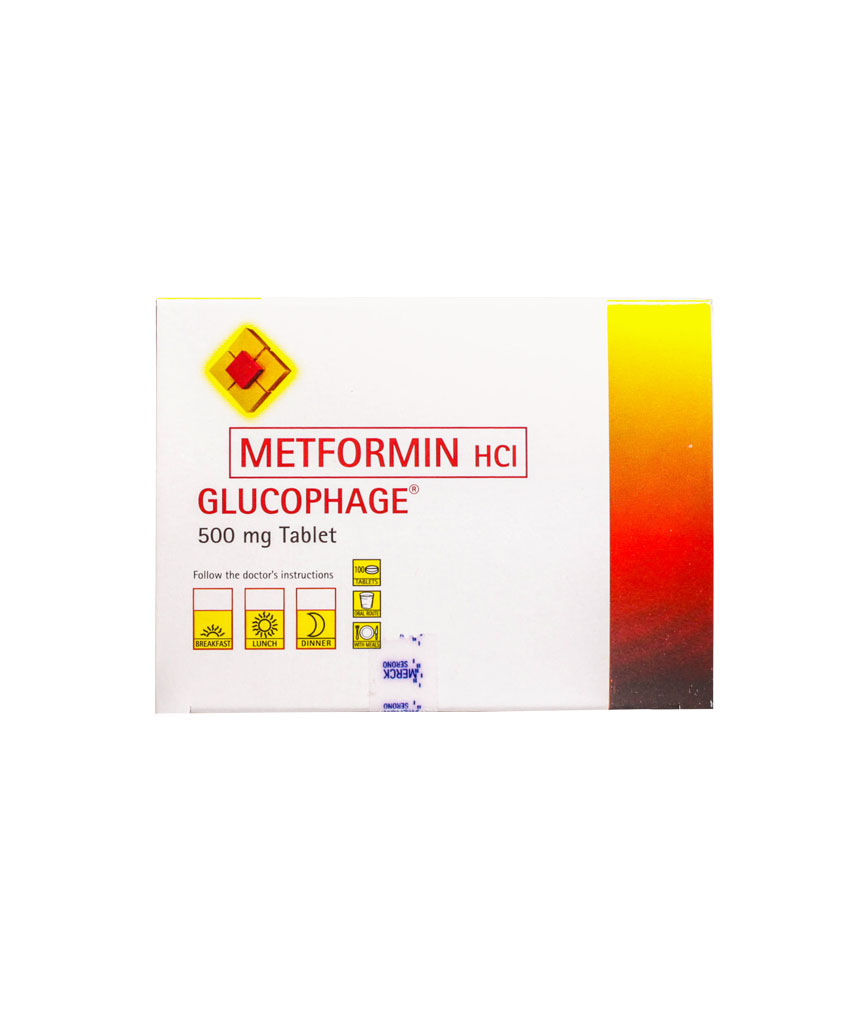Description
Get Glucophage 500Mg Tablet at Rose Pharmacy Medicine Delivery
Description :
Glucophage: Each 500-mg and 1-g tablet contains metformin HCl 500 mg and 1 g, equivalent to metformin base 390 mg and 780 mg, respectively.
Glucophage Forte: Each tablet contains metformin HCl 850 mg, equivalent to metformin base 663 mg.
Glucophage XR: Each tablet of Glucophage XR contains metformin HCl 500 mg, 750 mg and 1 g, respectively.
Indications / Uses :
Treatment of type 2 diabetes mellitus, particularly in overweight patients, when dietary management and exercise alone does not result in adequate glycemic control. In adults and children =10 years and adolescents, Glucophage/Forte/Glucophage XR may be used as monotherapy or in combination with other oral antidiabetic agents or with insulin.
Intensive glucose control with metformin as 1st-line therapy in overweight type 2 diabetic patients has been shown to reduce diabetes complications.
Impaired glucose tolerance for patients in whom lifestyle interventions have failed.
A reduction of diabetic complications has been shown in overweight type 2 diabetic adult patients treated with metformin as 1st-line therapy after diet failure (see Pharmacology under Actions).
Administration :
Should be taken with food: XR tab: Swallow whole, do not chew/crush.
Contraindications :
Hypersensitivity to metformin HCl or to any of the excipients of Glucophage/Glucophage Forte/Glucophage XR.
Severe destabilization of diabetes (ketoacidosis or pre-coma).
Renal insufficiency even if moderate impairment of kidney function with increased blood creatinine levels or decreased creatinine clearance <60 mL/min.
Acute conditions with the potential to alter renal function eg, dehydration due to persistent or severe diarrhea, recurrent vomiting; severe infection (eg, respiratory and urinary tract infection); following an x-ray administration involving the use of iodinated contrast media (eg, IV urography, angiography).
Elective major surgery (see Precautions).
Acute or chronic disease which may cause tissue hypoxia eg, heart failure, recent myocardial infarction, respiratory insufficiency, shock.
Hepatic insufficiency (impaired liver function).
Acute alcohol intoxication, alcoholism (excessive consumption of alcoholic beverages).
Use in pregnancy & lactation: To date, no relevant epidemiological data are available. Animal studies do not indicate harmful effects with respect to pregnancy, embryonal or fetal development, parturition or postnatal development (see Pharmacology: Toxicology under Actions).
When the patient plans to become pregnant and during pregnancy, diabetes should not be treated with metformin but insulin should be used to maintain blood glucose levels as close to normal as possible in order to lower the risk of fetal malformation associated with abnormal blood glucose levels.
Glucophage/Glucophage Forte/Glucophage XR is contraindicated during lactation (breastfeeding).
Metformin is excreted into milk in lactating rats. Similar data is not available in humans and a decision should be made whether to discontinue nursing or to discontinue metformin, taking into account the importance of the compound to the mother.
Special Precautions :
Renal Function: As metformin is excreted by the kidney, serum creatinine levels should be determined before initiating treatment (Glucophage XR: creatinemia <135 micromol/L in males and <110 micromol/L in females) and regularly thereafter: At least annually in patients with normal renal function; and at least 2-4 times a year in patients with serum creatinine levels at the upper limit of normal and in elderly subjects.
Decreased renal function in elderly subjects is frequent and asymptomatic. Special caution should be exercised in situations where renal function may become impaired eg, when initiating antihypertensive therapy or diuretic therapy and when starting therapy with an NSAID.
Administration of an Iodinated Contrast Agent: As the IV administration of iodinated contrast materials in radiologic studies eg, IV urography or angiography can lead to renal failure resulting in metformin accumulation and a risk of lactic acidosisl.
Metformin should be discontinued prior to, or at the time of the test and not reinstituted until 48 hrs afterwards, and only after renal function has been re-evaluated and found to be normal (See Interactions).
Metformin HCl should be discontinued 48 hrs before elective surgery with general anesthesia and should not be usually resumed earlier than 48 hrs afterwards and only after renal function has been reevaluated and found to be normal.
Surgery: If a patient is going to have an elective major surgery, treatment with Glucophage XR must be discontinued 48 hrs before the surgery. It should not be reinstituted until 48 hrs after the surgery and only after ensuring that kidney function is normal.
Other Precautions: Certain illnesses or medications eg, corticosteroids, diuretics, ?2-agonists (eg, salbutamol, terbutaline) and angiotensin-converting enzyme (ACE) inhibitors may cause more or less severe destabilization of diabetes. The physician should be informed of any other concurrent treatment and of any infectious illnesses eg, influenza, respiratory or urinary tract infection.
Consumption of alcoholic beverages has to be avoided.
Metformin alone never causes hypoglycemia, although caution is advised when it is used in combination with insulin or sulfonylureas.
All patients should continue their diet with a regular distribution of carbohydrate intake during the day. Overweight patients should continue their energy-restricted diet.
The usual laboratory tests for diabetes monitoring should be performed regularly.
Effects on the Ability to Drive or Operate Machinery: Metformin monotherapy does not cause hypoglycemia and therefore has no effect on the ability to drive or to use machines.
However, patients should be alerted to the risk of hypoglycemia when metformin is used in combination with other antidiabetic agents (sulfonylureas, insulin, glinides or other hypoglycemic agents). It is important to be aware of the onset of hypoglycemia. Symptoms of hypoglycemia include weakness, dizziness, increased sweating, fast heartbeat, vision disorders or difficulty in concentration. Patient should not drive or use machines if these symptoms occur.
Use in children: The diagnosis of type 2 diabetes mellitus should be confirmed before treatment with metformin is initiated.
No effect of metformin on growth and puberty has been detected during controlled clinical studies of 1-year duration but no long-term data on these specific points are available. Therefore, a careful follow-up of the effect of metformin on these parameters in metformin-treated children, especially pre-pubescent children, is recommended.
Children Between 10 and 12 years: Only 15 subjects between 10 and 12 years were included in the controlled clinical studies conducted in children and adolescents. Although metformin efficacy and safety in children <12 years did not differ from efficacy and safety in older children, particular caution is recommended when prescribing to children between 10 and 12 years.














Reviews
There are no reviews yet.